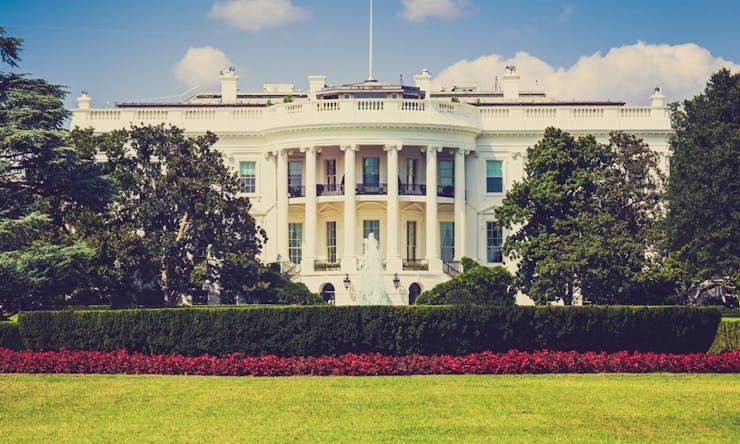A historic meeting earlier today between White House officials and Washington D.C. cannabis legalization advocates yielded no comment or commitment from the Obama Administration, but the District activists walked away with positive vibes.
Adam Eidinger and Nikolas Schiller, leaders of the group DCMJ, were invited to speak with White House staffers in a private meeting with two unnamed White House staffers who were apparently instructed to listen, take notes and not to answer questions. Eidinger, an experienced citizen lobbyist, told Leafly after the meeting that the officials’ body language alone was encouraging. “They both displayed thoughtful, sincere body language during the entire meeting… We got a lot of nods, a lot of smiles.”
Eidinger got straight to the point his pitch to the staffers:
“We really need to start looking at it as a political solution,” he said. “It’s not something we can wait for the medical research on — there’s already enough! We’ve got to get out of this incremental world view and start thinking about a federal flip.”
The biggest message Eidinger and Schiller tried to drive home was that this is just the beginning of the conversation. DCMJ has already created a trending hashtag for the movement: #WeNeedaHigherLevelMeeting.
“We really should have a summit” at the White House, Eidinger said. “They would invite people to the White House in a high-profile way and let the President just listen. He doesn’t even have to say anything, he just needs to listen. Because it’s going to take a year of dialogue at the federal level to figure out federal legalization.”
“At the very least, we can end the arrests, legalize home cultivation,” Eidinger said. “Then we can figure a fair tax and regulatory system at a federal level. We’re trying to think big.”
Eidinger didn’t dismiss the Obama Administration’s contributions to drug policy reform. “President Obama has done more for marijuana reform than any president since marijuana was outlawed.”
However, Eidinger added, Obama hasn’t gone far enough on drug reform – yet.
“We need a federal bill that the President supports. Historically, drug policy comes from the White House. The White House could listen for a year and then present Congress with a coherent federal policy. Take it entirely out of the Controlled Substances Act and treat it separately. Marijuana is not a drug, marijuana is a plant. Compounds like Tylenol and Advil – those are drugs. This is a plant, it’s very straightforward, it’s nonlethal, it doesn’t have any lethality that would justify imprisoning the people who sell it.”
One of the suggestions Eidinger offered to the White House aides was his service in helping organize such a meeting.
“We could really help you stage an amazing event here at the White House where you really do listen and we bring in patient advocates, we bring in victims who have been in jail for a long time for low-level marijuana offenses, we can bring in senior citizens who benefitting from the medicine who weren’t believers but now they are – we have all these great people who are willing to talk about marijuana being legal and it being a good thing. Why not take advantage of us? Use us! That’s the message. We wanna do the right thing. We don’t want to organize any more protests. But we’re going to if you don’t begin this dialogue.”







